
UNCHRONICLE,
THE MAN WHO NEVER LAUNCHED,
CHRONICLE OF THE FURLED SAIL,
THE UNQUEST OF LARRY PRUFROCKSKI
ANNO
STELLAE


Everything went more or less routinely at the onset, however, so he did not have any inkling of what lay ahead. The group toured Moscow and Leningrad, and on the first optional tour they all agreed to doing, the capital of SSR Georgia, a Soviet Republic at the southern end of the sky-scratching Caucasian Mountains.
But on the way, wouldn't you know the ladies had all agreed on yet another optional sidetrip, just to break up the long flight to the Soviet Republic of Georgia?
Afterwards, he tried successfully to blank out the experience, which he found easy enough to do, having a mind that was suited to compartmentalization.
In Soviet Georgia, he soon learned the past was as important, in many cases more important, than the present. in ancient Georgia, Argonauts led by Jason had ended their epic journey and launching into the unknown in quest of the Golden Fleece--and the Georgians, proud descendants of the original people of Colchis (as the country was then called) were long of memory and had never forgotten the Argonauts. Traditions, songs, music, folklore, styles of clothes, even dances, all commemorated Jason and the Argonauts' famous visit to Aea, the capital of Colchis. Tbilisi, the capital of Georgia, trotted out, for the entertainment of visiting Westerners at the airport, Georgian dancers and singers and acrobats, and their theme was, not hard to guess, Jason and the Argonauts.
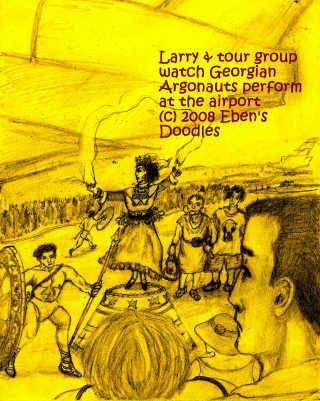
Ero's programmed, flying mast passed over Tula, Russia, then moved toward the Tolystoyan estate called Yasnaya Polyana.
Before this photo-cell played out its contents completely to Ero's view, Larry, in another time and place, viewing the dancers and performers attired in the archaic Greek mode, was not impressed. He hoped it would soon be over so he could go to the hotel and take a bath, even though it would probably be in in one of those strange contraptions seen all over the Soviet Union, the type he could just barely squeeze his six foot frame into, while spraying himself with a ridiculous hand-held device.
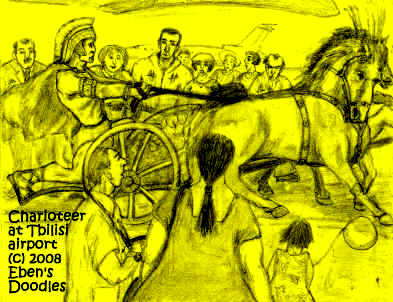
Why didn't he stay to vote it down?--he had to wonder. He had been so antsy during the build-up for the optional tour, he had left the group and gone out to get himself an ice cream cone (as ice cream or any treats between meals was unavailable in the hotel). The guide had raved on and on about Tolstoy's estate, Yasnaya Polyana, and how they couldn't possibly bypass it and still claim they had seen Russia's "heart and soul". The drivel of that man! He was an outrageous scoundrel!
Larry wanted nothing to do with it, since he heard it cost $350 American dollars extra. They were promised a look at Anna Kerenina and other beauties in Tolstoy's museum on the estate. She was supposed to represented by a perfect wax replica, which had a live audio in the exhibit. Tolstoy too was there, speaking in audio, from actual recordings by Alexander Graham Bell's newly created "phonograph," which was very one the famous inventor had sent the world-famous author to record his immortal voice. How could they pass this up--the doomed lover Anna who committed suicide when her husband took the child and cast her off, and the writer himself, Leo Tolstoy, who was Russia's greatest author?
Well, it didn't appeal at all to him--so he walked out. But what a mistake! The group voted him unaminously for the option trip, he was the lone absentee vote, which was not counted anyway.
So, instead of the nice direct flight to Soviet Georgia And thence to Tashkent, they boarded a train and traveled to Tula and disembarked, taking a ten mile bus trip to the estate hidden in the forest hills. Here they would see real, live peasants and take a look also at their quaintly carved, log-beamed cottages called izbas.
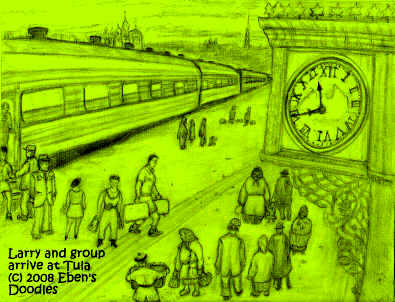
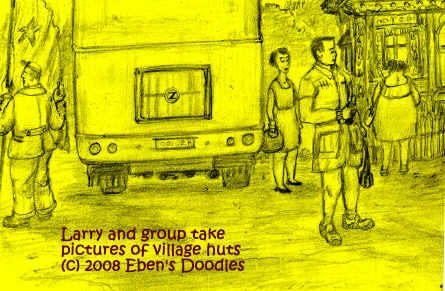

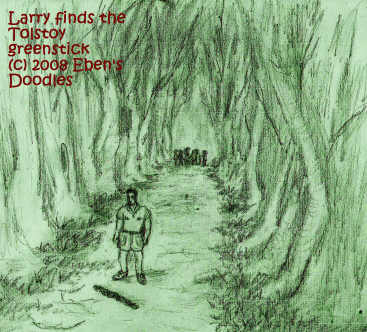
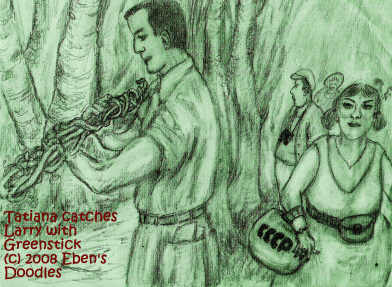
"Sir, was that you were holding just now?" Tatiana demanded.
"Nothing you would find interesting!" he said. "Just some old stick a dog dropped! Now would you please excuse me?"
That was the end of the annoying conversation, he thought. She wouldn't have anything more to ask him about. As for the green stick, was it really Tolstoy's Stick of Happiness? Why wasn't it in a display case then in the museum? Why did he leave it hidden in the woods, for some half-wild mutt to dig up 80 years after his death? Was he in too much a hurry to get away from an old battleax of a wife to go retrieve the stick and take it with him on his last journey?
They would never know the answers, Larry thought. Anyway, there were more important things to deal with--as far as the guide was concerned. He quickly shepherded them all to the next highlight on the itinerary.
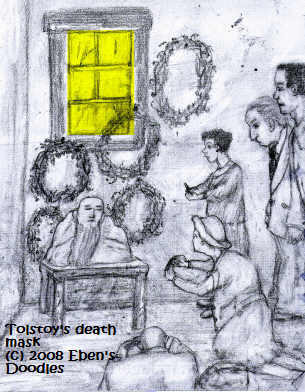
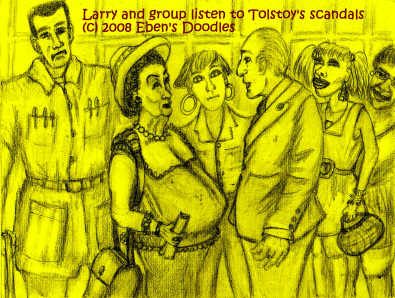
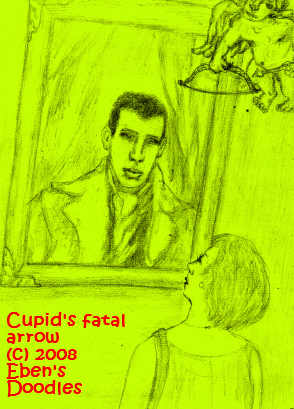

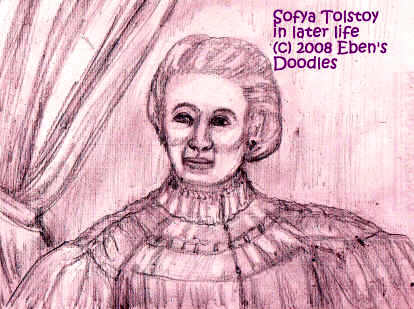
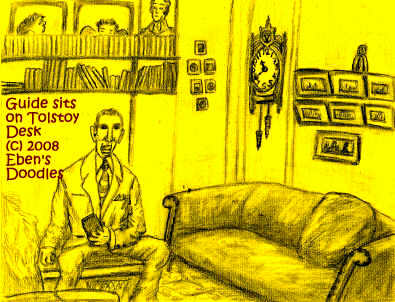
Larry quickly found his way out, while the guide was shamelessly overcharging the women who wanted the wreaths.
Larry's disinterest had communicated to the others, and only two women bought the wreathes and followed the guide to the author's grave.
Just the same, Larry was interested enough to follow the pilgrims as the guide led forth to the spot where they could perform the ceremony.
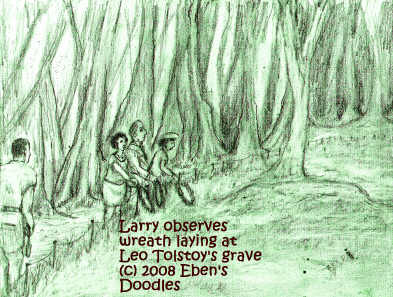
This finished, the guide hurried to join the group. Larry let him go by, then followed at a discreet distance, but noticed something or someone was behind a tree, and he crept up as quietly as he could, and then realized it had to be Tatiana, for he saw a bit of her arm and clothing that told him who it was.
He went and pulled up a stake that held the fencing along the path, and reached round the tree where she was hiding on the other side. When he touched her arm with the iron stake, a moment passed, then suddenly she screamed, and bolted straight ahead and up the path, not taking one look back as she ran for her life.
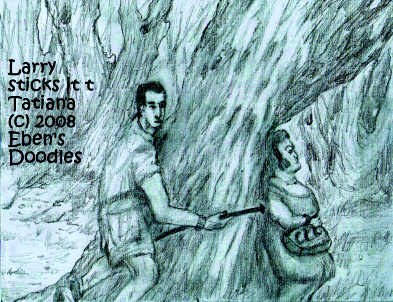
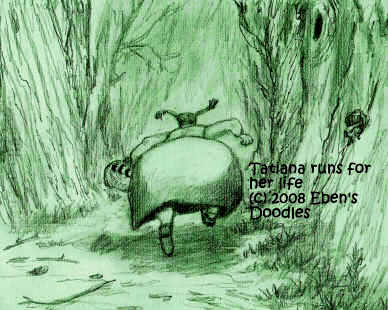
"Served her right if she was scared silly!" he thought, laughing to himself. "I had her spotted from the moment I first saw her as a KGB snoop! Who do they think they are fooling? They'll have to get up early to get around me!" He turned to the scenery again as the bus started off, which also refueled the conversations, which had died abruptly when he jumped onboard, flashing everybody, even Tatiana, a toothy grin.
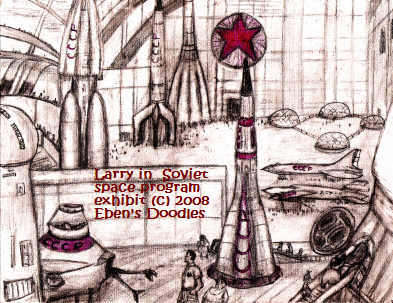
Looking into the prototype housing of one planned but cancelled robotic moon probe Krushchev had lost his shirt on (and maybe a shoe as well), which was designed for digging into the moon's crust for valuable metals and ores, he noticed that the missile shaft used for the digger's spike-pronged bit had no safety barrier. That was typically Russian! They cared nothing for people's safety--people were expendable! There wasn't even some yellow caution tape strung across the shaft. "Just like these dumb Commies," he thought, "with so many disposable people in the Soviet Union, they don't bother themselves about such things as safety and human life!" Of course, he didn't care that much either, to tell the truth--but he hadn't paid good money to discover himself, he was here to take a look at the Soviet Union and how it measured up to things back home!
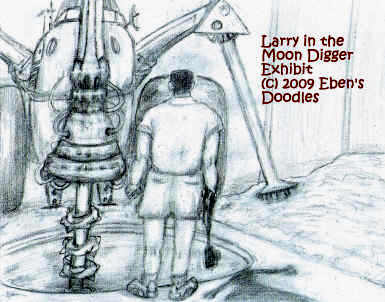
There was a definite impact far below, a sound that resembled a lot of vanilla pudding (a lot!) splatting a wall.
Larry peered over the edge of the hole, and wondered what he should do. Could it have been Tatiana? Had she really tried to rush him and give him a KGB-style accident?
It seemed so farfetched. It was like something he read in spy thrillers or saw in the movies. Could she be so vengeful and hysterical a female to as that? But he reminded himself, she wasn't America. He couldn't apply the same standards to her. She was one of these half-civilized Russkies, who were not even really Europeans. Half their country or more was in Asia and Siberia--which meant they were civilized only skin deep at best. That explained their terrific emotional tantrums and downright savagery, peeling wallpaper in hotel rooms, and poor plumbing. What she experienced in the moon shaft she brought entirely on herself--as he had only been teasing her a little, and shouldn't have taken it so personally. After all, he cared nothing for her--so he knew he hadn't meant anything personal.
Moving away, he went to find the guide, then reconsidered. Why would they believe him, that he hadn't pushed her in, if that was where she was? He would be arrested immediately, and considered guilty, as that was the Soviet way of doing things. His being American wouldn't count for much, not for years anyway. He'd be stuck up in some stinking, permafrosted Siberian gulag, to dig frozen turnips from the ground or take axes and chop out ditches or latrines, in the midst of a blizzard, starved and beaten up by the guards as often as they liked, while World Council of Churches bishops toured the facility approvingly while the U.S. ambassador in Moscow petitioned the Soviet Government, who no doubt would deny they knew anything about his whereabouts!
No, he couldn't risk that fate. Imagine, having to grin and stand for group pictures and look happy whenever touring bishops and churchmen and other overdressed, sanctimonious old farts from the WCC and the various Human Rights organizations came to inspect how the prisoners were faring! It had happened to too many stupid travelers. Best say nothing, and let THEM discover Tatiana's sad tumble down the "Moon Shaft." It was either him or her, right? Better it was her then!
"Served her right too," he thought as he made his way back to the group, looking as bored and indifferent as he could. He bought an ice cream cone on the way just to reinforce the impression he wanted to make--that nothing unusual had happened to him lately.
An hour later, as the guide was ready to wrap it up with the exact measurements and sizes of various mammoth objects of Soviet technical wizardry, an officer, by looks and uniform, pulled the guide aside, there was a hurried conversation, with many violent, over-emotional Russian-style gestures.
Mopping his forehead with a big, not very clean handkerchief, the guide gave a very concerned look, counting every one of them on the tour several times, before slumping down on a chair.
"I suppose now I ought to go ask him what is going on," Larry thought. They will think something a little fishy if I don't at least show some concern in the scene.
He went over to the guide, while other women joined his lead, and then they heard that Tatiana was, indeed, missing. There was a security lockdown of the entire area, and a thorough search was going on, and they were to remain there until she was located. The Soviet authorities meant business about this, too, Larry saw--having brought in armed guards and stationed them at the exits.
A look at the guide's face told Larry the rest of the story, however. As if he was staring into a future in a Siberian gulag, he was so pale, sweaty, and breathless, it had to be that Tatiana was already found, and it wasn't a nice discovery either. How long would it take for the KGB to make a decision and let them go? It was all the guides' fault for whatever happened--right? He was leading the tour--so he was responsible for anything that went wrong. But though it was simple enough to decide, grab the guide and haul him off and let him and the others go to dinner, the Russian bureaucracy was notorious--it could take hours before they were considered harmless enough to be let go.
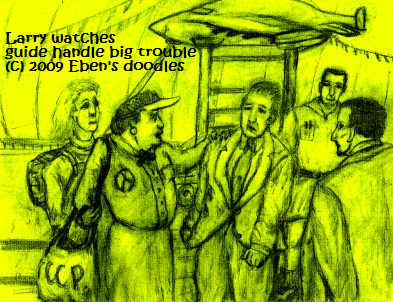
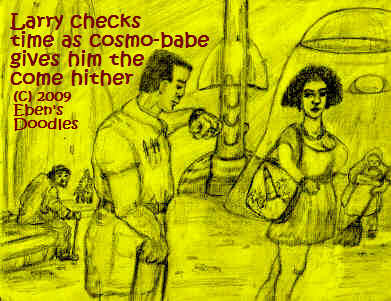
Hungry and bored stiff, Larry walked away, looking for an ice cream vender, but he couldn't find one, and then circled the hall, hoping to spot something he hadn't seen before.
Oh, yes, the old nuclear rocket! He had read about it in the brochure the guide handed out when he brought them all there to take a look at the artistic renderings of the rocket in space flight.
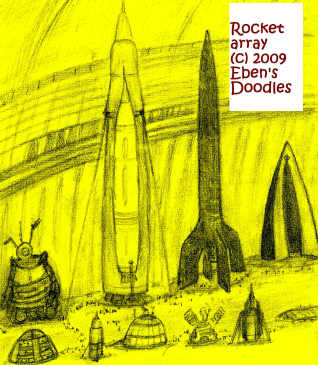
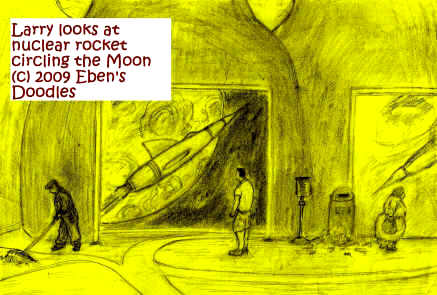
But here was a a working prototype of the Soviet nuclear rocket, still able to fly, from the looks of it! Both it and the early prototype of the SL-series booster looked in mint condition, kept mothballed for decades in some thermostat-controlled underground silo in a top secret spaceport 600 miles north of Moscow, then recently, its top secret classification reviewed and downgraded to public domain, hauled down on a special train to Tula's Space Museum to be put on prominent display.
What would he find inside, if he could make it from the booster to the rocket itself? How had they planned to keep the first cosmonauts alive in a nuclear rocket for weeks on end as they explored the Moon, then the rest of the Solar System and then Alpha Centauri before returning to earth?
The ladder to the open hatch of the piggyback rocket was still there in place, but the guide hadn't allowed any of them to climb it, since it was too tall and shaky a conveyance for the more "mature" ladies, and they had passed the exhibit by after a long, monotonous listing of the sizes and weights of the booster and rocket. But now was his chance to see something really interesting! He started climbing the extension aluminum ladder and soon was up to the door, high above the floor.
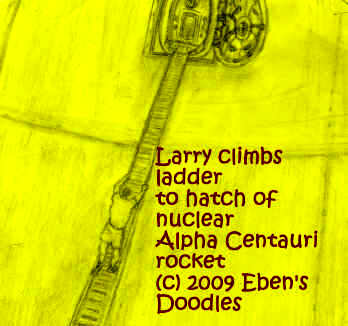
Being a mechanically-minded man, he did not have any problem with the primitive elevator, seeing how to work it, and though it was a close fit--something like a dumb waiter in size, only open and cagelike--he squeezed in, then operated the manual lift system with his hands. Up he went! He didn't know, but behind him the automatic locking system had an early version of the electronic eye and had worked, so that it had closed and sealed the entrance hatch.
He knew he had to hurry if he wasn't going to miss his group's release and the bus to the restaurant, if there was going to be a meal for them there, that is.
The elevator halted at the level of the living quarters, which lay below the retractible cockpit. He crawled out of the elevator and shone his flash light.
Working various switches, watching the gauges to see what responses he could get, he didn't imagine, however, that the engines would actually fire. After all, he thought not even the Russians would be so stupid as to leave that much fuel and juice in the operating and propulsion systems.
He was quite wrong. Soon the unexpected happened. The engines began firing on the booster. Then the computers, such as they were in that 1960s rocket, began to take over, and he watched helplessly, wondering how to stop the progression of events the dials and gauges were registering taking place right before his horrified eyes.
Realizing he needed to flee for his life, Larry sprang up from his cockpit chair, but wasn't quite fast enough. The booster rose, and he was slammed back down in his chair by immense forces.
Meanwhile, in the vast building something going on with the stellar rocket was beginning to be noticed. As huge clouds of fire and smoke spewed out into the building and the rocket and booster strained upwards against the restraining cables anchored in concrete, people started screaming and hurrying away as fast as they could.
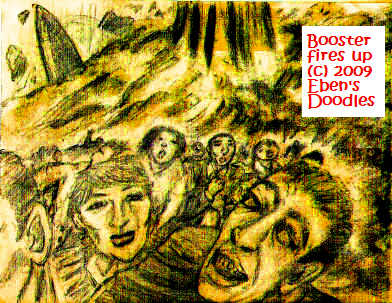
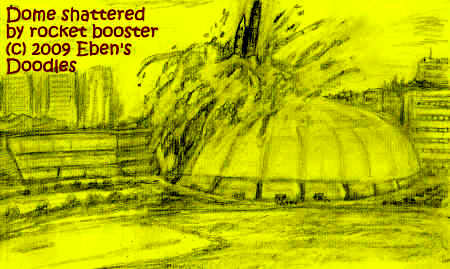

The lights in the cabin also flicked on and off, which was not the rocket's fault--it was just that more power was being generated than the system could handle at times, and the overloads was forcing the surge protectors to shut down parts of the system. Gradually, however, the primitive computers aboard gained more control, and the system leveled off and Larry found himself in a more or less normal flying mode to see how he might take command. How long it would last, he did not know. He had to work fast, he realized.
He flicked on switches, then rapidly flicked them back where they had been set, just to see what might happen. But this could be disastrous, so he didn't experiment very much. It was the guidance control system he was after--the one that was on auto-pilot. He had to take manual conrol somehow! His life, he knew, depended on it. If he could just get the booster to get him to a body of water big enough to take a splash down, he might have a chance to bail out and swim to land. He knew he was heading west, from the ship compass, and would soon be over Germany or even France, depending on whether he came from the north or swung round Germany and crossed the Alps into France.
He hoped he might make it to the English Channel. That was big enough to ditch the booster and rocket in, flying it low enough to drop it in, hopefully at a slow enough speed to avoid a disastrous flipping over.
He could see the glint of water far ahead, and knew it was the North Sea. But then the booster surged out of control, and all he could do was hang on, as it swung him and the rocket southerly. Gripping the manual control, punching some switches randomly, he found the manual control responding for the first time, and he kept the booster from turning directly south, which would have put him over Africa. A crash landing in the Sahara sands somewhere, hundreds of miles from anywhere--terrible! Nobody would survive that.
As the booster began to lose power, he gained some confidence. He could make a glider out of it, and they were still at such a high alitude, he could just drop gradually down toward the Channel.
But Larry was not in control, as he thought. The booster separated just as he was nearing the suburbs of Paris and the legendary Seine was winding below him through the big green, chateau-studded Loire valley. The rocket was thrown free, and the engines ignited. He was on his own, and the manual system in his hand came alive, with all sorts of 1960s beeps and flashing lights on the operator's display--there was no need to force it to do anything! He was in command of earth's first operating nuclear rocket!
Unfortunately, this all happened so quickly, the next thing he knew was that he had rapidly descended and something very tall and big that looked disturbingly like the Eiffel Tower was looming straight ahead!
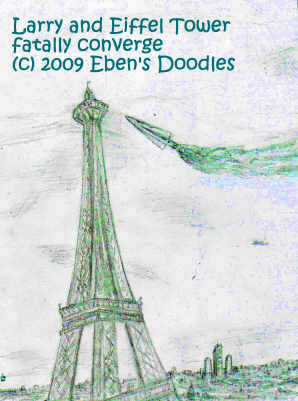
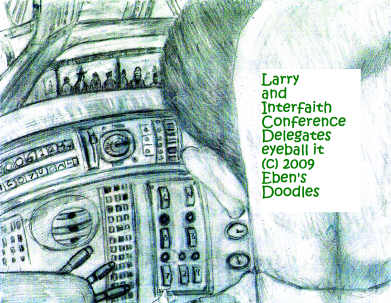


There was a definite impact far below, a sound that resembled a lot of vanilla pudding (a lot!) splatting a wall.
Larry peered over the edge of the hole, and wondered what he should do. Could it have been Tatiana? Had she really tried to rush him and give him a KGB-style accident?
It seemed so farfetched. It was like something he read in spy thrillers or saw in the movies. Could she be so vengeful and hysterical a female to as that? But he reminded himself, she wasn't America. He couldn't apply the same standards to her. She was one of these half-civilized Russkies, who were not even really Europeans. Half their country or more was in Asia and Siberia--which meant they were civilized only skin deep at best. That explained their terrific emotional tantrums and downright savagery, peeling wallpaper in hotel rooms, and poor plumbing. What she experienced in the moon shaft she brought entirely on herself--as he had only been teasing her a little, and shouldn't have taken it so personally. After all, he cared nothing for her--so he knew he hadn't meant anything personal.
Moving away, he went to find the guide, then reconsidered. Why would they believe him, that he hadn't pushed her in, if that was where she was? He would be arrested immediately, and considered guilty, as that was the Soviet way of doing things. His being American wouldn't count for much, not for years anyway. He'd be stuck up in some stinking, permafrosted Siberian gulag, to dig frozen turnips from the ground or take axes and chop out ditches or latrines, in the midst of a blizzard, starved and beaten up by the guards as often as they liked, while World Council of Churches bishops toured the facility approvingly while the U.S. ambassador in Moscow petitioned the Soviet Government, who no doubt would deny they knew anything about his whereabouts!
No, he couldn't risk that fate. Imagine, having to grin and stand for group pictures and look happy whenever touring bishops and churchmen and other overdressed, sanctimonious old farts from the WCC and the various Human Rights organizations came to inspect how the prisoners were faring! It had happened to too many stupid travelers. Best say nothing, and let THEM discover Tatiana's sad tumble down the "Moon Shaft." It was either him or her, right? Better it was her then!
"Served her right too," he thought as he made his way back to the group, looking as bored and indifferent as he could. He bought an ice cream cone on the way just to reinforce the impression he wanted to make--that nothing unusual had happened to him lately.
An hour later, as the guide was ready to wrap it up with the exact measurements and sizes of various mammoth objects of Soviet technical wizardry, an officer, by looks and uniform, pulled the guide aside, there was a hurried conversation, with many violent, over-emotional Russian-style gestures.
Mopping his forehead with a big, not very clean handkerchief, the guide gave a very concerned look, counting every one of them on the tour several times, before slumping down on a chair.
"I suppose now I ought to go ask him what is going on," Larry thought. They will think something a little fishy if I don't at least show some concern in the scene.
He went over to the guide, while other women joined his lead, and then they heard that Tatiana was, indeed, missing. There was a security lockdown of the entire area, and a thorough search was going on, and they were to remain there until she was located. The Soviet authorities meant business about this, too, Larry saw--having brought in armed guards and stationed them at the exits.
A look at the guide's face told Larry the rest of the story, however. As if he was staring into a future in a Siberian gulag, he was so pale, sweaty, and breathless, it had to be that Tatiana was already found, and it wasn't a nice discovery either. How long would it take for the KGB to make a decision and let them go? It was all the guides' fault for whatever happened--right? He was leading the tour--so he was responsible for anything that went wrong. But though it was simple enough to decide, grab the guide and haul him off and let him and the others go to dinner, the Russian bureaucracy was notorious--it could take hours before they were considered harmless enough to be let go.


Hungry and bored stiff, Larry walked away, looking for an ice cream vender, but he couldn't find one, and then circled the hall, hoping to spot something he hadn't seen before.
Oh, yes, the old nuclear rocket! He had read about it in the brochure the guide handed out when he brought them all there to take a look at the artistic renderings of the rocket in space flight.


But here was a a working prototype of the Soviet nuclear rocket, still able to fly, from the looks of it! Both it and the early prototype of the SL-series booster looked in mint condition, kept mothballed for decades in some thermostat-controlled underground silo in a top secret spaceport 600 miles north of Moscow, then recently, its top secret classification reviewed and downgraded to public domain, hauled down on a special train to Tula's Space Museum to be put on prominent display.
What would he find inside, if he could make it from the booster to the rocket itself? How had they planned to keep the first cosmonauts alive in a nuclear rocket for weeks on end as they explored the Moon, then the rest of the Solar System and then Alpha Centauri before returning to earth?
The ladder to the open hatch of the piggyback rocket was still there in place, but the guide hadn't allowed any of them to climb it, since it was too tall and shaky a conveyance for the more "mature" ladies, and they had passed the exhibit by after a long, monotonous listing of the sizes and weights of the booster and rocket. But now was his chance to see something really interesting! He started climbing the extension aluminum ladder and soon was up to the door, high above the floor.

Being a mechanically-minded man, he did not have any problem with the primitive elevator, seeing how to work it, and though it was a close fit--something like a dumb waiter in size, only open and cagelike--he squeezed in, then operated the manual lift system with his hands. Up he went! He didn't know, but behind him the automatic locking system had an early version of the electronic eye and had worked, so that it had closed and sealed the entrance hatch.
He knew he had to hurry if he wasn't going to miss his group's release and the bus to the restaurant, if there was going to be a meal for them there, that is.
The elevator halted at the level of the living quarters, which lay below the retractible cockpit. He crawled out of the elevator and shone his flash light.
Working various switches, watching the gauges to see what responses he could get, he didn't imagine, however, that the engines would actually fire. He was just having himself a little fun, after enduring so much waiting for the boring old Russian police and KGB to do their thing and finish and then let them go. After all, he thought not even the Russians would be so stupid as to leave that much fuel and juice in the operating and propulsion systems.
He was quite wrong. Soon the unexpected happened. The engines began firing on the booster. Then the computers, such as they were in that 1960s rocket, began to take over, and he watched helplessly, wondering how to stop the progression of events the dials and gauges were registering taking place right before his horrified eyes.
Realizing he needed to flee for his life, Larry sprang up from his cockpit chair, but wasn't quite fast enough. The booster rose, and he was slammed back down in his chair by immense forces.
Meanwhile, in the vast building something going on with the stellar rocket was beginning to be noticed. As huge clouds of fire and smoke spewed out into the building and the rocket and booster strained upwards against the restraining cables anchored in concrete, people started screaming and hurrying away as fast as they could.



The lights in the cabin also flicked on and off, which was not the rocket's fault--it was just that more power was being generated than the system could handle at times, and the overloads was forcing the surge protectors to shut down parts of the system. Gradually, however, the primitive computers aboard gained more control, and the system leveled off and Larry found himself in a more or less normal flying mode to see how he might take command. How long it would last, he did not know. He had to work fast, he realized.
He flicked on switches, then rapidly flicked them back where they had been set, just to see what might happen. But this could be disastrous, so he didn't experiment very much. It was the guidance control system he was after--the one that was on auto-pilot. He had to take manual conrol somehow! His life, he knew, depended on it. If he could just get the booster to get him to a body of water big enough to take a splash down, he might have a chance to bail out and swim to land. He knew he was heading west, from the ship compass, and would soon be over Germany or even France, depending on whether he came from the north or swung round Germany and crossed the Alps into France.
He hoped he might make it to the English Channel. That was big enough to ditch the booster and rocket in, flying it low enough to drop it in, hopefully at a slow enough speed to avoid a disastrous flipping over.
He could see the glint of water far ahead, and knew it was the North Sea. But then the booster surged out of control, and all he could do was hang on, as it swung him and the rocket southerly. Gripping the manual control, punching some switches randomly, he found the manual control responding for the first time, and he kept the booster from turning directly south, which would have put him over Africa. A crash landing in the Sahara sands somewhere, hundreds of miles from anywhere--terrible! Nobody would survive that.
As the booster began to lose power, he gained some confidence. He could make a glider out of it, and they were still at such a high alitude, he could just drop gradually down toward the Channel.
But Larry was not in control, as he thought. The booster separated just as he was nearing the suburbs of Paris and the legendary Seine was winding below him through the big green, chateau-studded Loire valley. The rocket was thrown free, and the engines ignited. He was on his own, and the manual system in his hand came alive, with all sorts of 1960s beeps and flashing lights on the operator's display--there was no need to force it to do anything! He was in command of earth's first operating nuclear rocket!
Unfortunately, this all happened so quickly, the next thing he knew was that he had rapidly descended and an unmistakable landmark of Paris, perhaps the most famous of all, was looming straight ahead! This looked like the coup de gras to Larry's eyes, and he grew very concerned for his own safety. A framework built entirely of massive iron girders, the Eiffel tower was in no danger of ever falling even in an devastating earthquake, and only a well-planned demolition explosion of some kind could compromise the major supports and perhaps topple it.
The tower quickly engulfed his vision. It was seemingly so close he could reach out and touch it! He could even see the faces of tourists, delegates from the Global Interfaith Conference (GIC)--Buddhist priests, Sufi imans, Taoist teachers, Hindu swamis, Wiccans, Druid priests, with some Aromatherapists thrown in for good measure. They were holding their annual world peace congress in Paris. Their attention turned to him naturally as he zoomed in like an enormous arrow, the most startling sight every viewed from the sky-scraping iron colossus. For a moment his eyes and their eyes met, and like an accident where all time stops and everything seems to hang agonizingly suspended, it was a moment of convergence he would never forget--if he ever lived through it, that is.


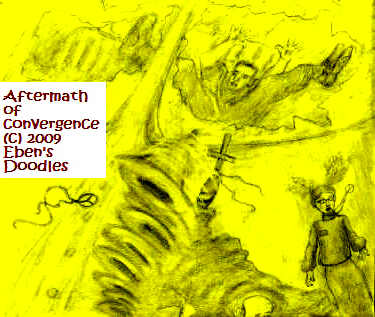

There was a definite impact far below, a sound that resembled a lot of vanilla pudding (a lot!) splatting a wall.
Larry peered over the edge of the hole, and wondered what he should do. Could it have been Tatiana? Had she really tried to rush him and give him a KGB-style accident?
It seemed so farfetched. It was like something he read in spy thrillers or saw in the movies. Could she be so vengeful and hysterical a female to as that? But he reminded himself, she wasn't America. He couldn't apply the same standards to her. She was one of these half-civilized Russkies, who were not even really Europeans. Half their country or more was in Asia and Siberia--which meant they were civilized only skin deep at best. That explained their terrific emotional tantrums and downright savagery, peeling wallpaper in hotel rooms, and poor plumbing. What she experienced in the moon shaft she brought entirely on herself--as he had only been teasing her a little, and shouldn't have taken it so personally. After all, he cared nothing for her--so he knew he hadn't meant anything personal.
Moving away, he went to find the guide, then reconsidered. Why would they believe him, that he hadn't pushed her in, if that was where she was? He would be arrested immediately, and considered guilty, as that was the Soviet way of doing things. His being American wouldn't count for much, not for years anyway. He'd be stuck up in some stinking, permafrosted Siberian gulag, to dig frozen turnips from the ground or take axes and chop out ditches or latrines, in the midst of a blizzard, starved and beaten up by the guards as often as they liked, while World Council of Churches bishops toured the facility approvingly while the U.S. ambassador in Moscow petitioned the Soviet Government, who no doubt would deny they knew anything about his whereabouts!
No, he couldn't risk that fate. Imagine, having to grin and stand for group pictures and look happy whenever touring bishops and churchmen and other overdressed, sanctimonious old farts from the WCC and the various Human Rights organizations came to inspect how the prisoners were faring! It had happened to too many stupid travelers. Best say nothing, and let THEM discover Tatiana's sad tumble down the "Moon Shaft." It was either him or her, right? Better it was her then!
"Served her right too," he thought as he made his way back to the group, looking as bored and indifferent as he could. He bought an ice cream cone on the way just to reinforce the impression he wanted to make--that nothing unusual had happened to him lately.
An hour later, as the guide was ready to wrap it up with the exact measurements and sizes of various mammoth objects of Soviet technical wizardry, an officer, by looks and uniform, pulled the guide aside, there was a hurried conversation, with many violent, over-emotional Russian-style gestures.
Mopping his forehead with a big, not very clean handkerchief, the guide gave a very concerned look, counting every one of them on the tour several times, before slumping down on a chair.
"I suppose now I ought to go ask him what is going on," Larry thought. They will think something a little fishy if I don't at least show some concern in the scene.
He went over to the guide, while other women joined his lead, and then they heard that Tatiana was, indeed, missing. There was a security lockdown of the entire area, and a thorough search was going on, and they were to remain there until she was located. The Soviet authorities meant business about this, too, Larry saw--having brought in armed guards and stationed them at the exits.
A look at the guide's face told Larry the rest of the story, however. As if he was staring into a future in a Siberian gulag, he was so pale, sweaty, and breathless, it had to be that Tatiana was already found, and it wasn't a nice discovery either. How long would it take for the KGB to make a decision and let them go? It was all the guides' fault for whatever happened--right? He was leading the tour--so he was responsible for anything that went wrong. But though it was simple enough to decide, grab the guide and haul him off and let him and the others go to dinner, the Russian bureaucracy was notorious--it could take hours before they were considered harmless enough to be let go.


Hungry and bored stiff, Larry walked away, looking for an ice cream vender, but he couldn't find one, and then circled the hall, hoping to spot something he hadn't seen before.
Oh, yes, the old nuclear rocket! He had read about it in the brochure the guide handed out when he brought them all there to take a look at the artistic renderings of the rocket in space flight.


But here was a a working prototype of the Soviet nuclear rocket, still able to fly, from the looks of it! Both it and the early prototype of the SL-series booster looked in mint condition, kept mothballed for decades in some thermostat-controlled underground silo in a top secret spaceport 600 miles north of Moscow, then recently, its top secret classification reviewed and downgraded to public domain, hauled down on a special train to Tula's Space Museum to be put on prominent display.
What would he find inside, if he could make it from the booster to the rocket itself? How had they planned to keep the first cosmonauts alive in a nuclear rocket for weeks on end as they explored the Moon, then the rest of the Solar System and then Alpha Centauri before returning to earth?
The ladder to the open hatch of the piggyback rocket was still there in place, but the guide hadn't allowed any of them to climb it, since it was too tall and shaky a conveyance for the more "mature" ladies, and they had passed the exhibit by after a long, monotonous listing of the sizes and weights of the booster and rocket. But now was his chance to see something really interesting! He started climbing the extension aluminum ladder and soon was up to the door, high above the floor.

Being a mechanically-minded man, he did not have any problem with the primitive elevator, seeing how to work it, and though it was a close fit--something like a dumb waiter in size, only open and cagelike--he squeezed in, then operated the manual lift system with his hands. Up he went! He didn't know, but behind him the automatic locking system had an early version of the electronic eye and had worked, so that it had closed and sealed the entrance hatch.
He knew he had to hurry if he wasn't going to miss his group's release and the bus to the restaurant, if there was going to be a meal for them there, that is.
The elevator halted at the level of the living quarters, which lay below the retractible cockpit. He crawled out of the elevator and shone his flash light.
The gauges and switches reminded him very much like what he had known in the trains. Working various switches, watching the gauges to see what responses he could get, he didn't imagine, however, that the engines would actually fire. He was just having himself a little fun, after enduring so much waiting for the boring old Russian police and KGB to do their thing and finish and then let them go. After all, he thought not even the Russians would be so stupid as to leave that much fuel and juice in the operating and propulsion systems.
He was quite wrong. Soon the unexpected happened. The engines ignited and began firing on the booster. Then the computers, such as they were in that 1960s rocket, began to take over, and he watched helplessly, wondering how to stop the progression of events the dials and gauges were registering taking place right before his horrified eyes.
Realizing he needed to flee for his life, Larry sprang up from his cockpit chair, but wasn't quite fast enough. The booster rose, and he was slammed back down in his chair by immense forces.
Meanwhile, in the vast building something going on with the stellar rocket was beginning to be noticed. As huge clouds of fire and smoke spewed out into the building and the rocket and booster strained upwards against the restraining cables anchored in concrete, people started screaming and hurrying away as fast as they could.



The lights in the cabin also flicked on and off, which was not the rocket's fault--it was just that more power was being generated than the system could handle at times, and the overloads was forcing the surge protectors to shut down parts of the system. Gradually, however, the primitive computers aboard gained more control, and the system leveled off and Larry found himself in a more or less normal flying mode to see how he might take command. How long it would last, he did not know. He had to work fast, he realized.
He flicked on switches, then rapidly flicked them back where they had been set, just to see what might happen. But this could be disastrous, so he didn't experiment very much. It was the guidance control system he was after--the one that was on auto-pilot. He had to take manual conrol somehow! His life, he knew, depended on it. If he could just get the booster to get him to a body of water big enough to take a splash down, he might have a chance to bail out and swim to land. He knew he was heading west, from the ship compass, and would soon be over Germany or even France, depending on whether he came from the north or swung round Germany and crossed the Alps into France.
He hoped he might make it to the English Channel. That was big enough to ditch the booster and rocket in, flying it low enough to drop it in, hopefully at a slow enough speed to avoid a disastrous flipping over.
He could see the glint of water far ahead, and knew it was the North Sea. But then the booster surged out of control, and all he could do was hang on, as it swung him and the rocket southerly. Gripping the manual control, punching some switches randomly, he found the manual control responding for the first time, and he kept the booster from turning directly south, which would have put him over Africa. A crash landing in the Sahara sands somewhere, hundreds of miles from anywhere--terrible! Nobody would survive that.
As the booster began to lose power, he gained some confidence. He could make a glider out of it, and they were still at such a high alitude, he could just drop gradually down toward the Channel.
But Larry was not in control, as he thought. The booster separated just as he was nearing the suburbs of Paris and the legendary Seine was winding below him through the big green, chateau-studded Loire valley. The rocket was thrown free into fields of wheat and vineyards, and the engines ignited. He was on his own, and the manual system in his hand came alive, with all sorts of 1960s beeps and flashing lights on the operator's display--there was no need to force it to do anything! He and this ancient computer system were in command of earth's first operating nuclear rocket!
Unfortunately, this all happened so quickly, the next thing he knew was that he had rapidly descended and an unmistakable landmark of Paris, perhaps the most famous of all, was looming straight ahead! This looked like the coup de gras to Larry's eyes, and he began to get concerned for his own safety. A framework built entirely of massive iron girders, the Eiffel tower was in no danger of ever falling even in a devastating earthquake, and only a well-planned demolition explosion of some kind could compromise the major supports and perhaps topple it.




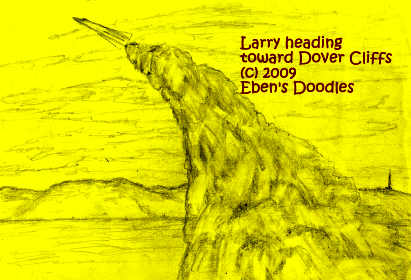
He was terrified, now that he had lost all control. What if he landed somewhere out in the howling wastes of the Arctic? He had to try to get control back. Pounding on the control panel, since he didn't know what to do with it anymore, he finally got a response, and the beeping light stopped, making him hope he had resumed manual control.
By this time, he was indeed careening across Arctic ice floes and bergs, and the cabin seemed to grow very cold, though it was probably more his imagination. Night was coming on. Later, by the time he learned how to use the manual control, the rocket had returned back to the route it had taken when he first turned on automatic pilot. He hadn't programmed it to do that, but clearly those was the instuctions the rocket had been given by the Soviets, and they were iron-clad. After much effort, all he achieved was bumping the rocket's course up a few degrees.
He was speeding up the Thames, which he didn't recognize until the landmarks of London began coming into view. Lit up at night, they were unmistakable--the Houses of Parliament, the Tower of London, Buckingham Palace, Winchester Cathedral, St. Paul's, Tralfalgar Square, Piccadilly's, etc. He knew it had to be London! No other city looked like that. But what was that huge neon-glowing figure of a man doing in the middle of the Thames up ahead?
Spotlights were fanning it where it was moving on a barge, and even at his height of several hundred feet he could see thousands of people on the Thames embankments watching it.
The colossus looked vaguely familiar. What was it? Then he thought: the King of Pop doing another mega-million dollar promotional stunt to hopefully revive flagging sales of his latest album? That huge, vulgar facsimile of him set on a barge with tugboats and other craft carrying spotlights and sound equipment for the travelling sound and light show, was hardly able to be squeezed up the broad Thames, and many large commercial boats and ships had to be moved or pulled into drydock to let it pass. Ever so often, the light show began, with the lights, colors, and patterns racing across the figure as the music boomed. It was the psychedelic dream of the late blasted into space Timothy O'Leary--and had cost millions. Would it succeed and bring in yet another world-wide craze for the King of Pop's latest necrophiliac release--"Corpses in Love"?


